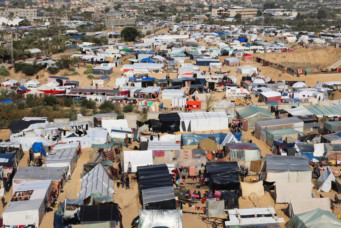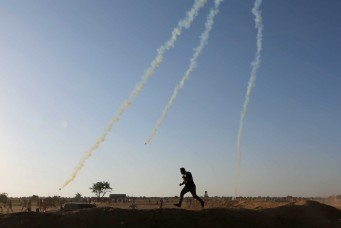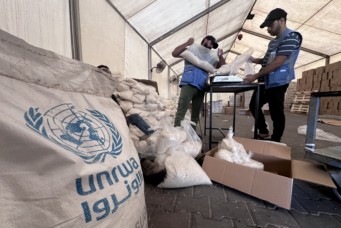Navigating the Politics of Humanitarian Aid in Gaza
Despite Israeli efforts to destroy it, UNRWA remains an embodiment of international responsibility for the question of Palestinian refugees, and a reminder of their inalienable right of return.

Members of the Jordanian Armed Forces wear oxygen masks as they prepare to airdrop medical aid destined to the Jordanian private field hospital in the southern Gaza city of Khan Younis, December 6, 2023. REUTERS/Jehad Shelbak.
Eight months into the genocide in Gaza, the severity of the crisis is staggering. Over 75 percent of the population has been displaced while more than 36,000 have been killed, with an estimated more than 8,100 missing or under the rubble. The whole of Gaza´s population is at imminent risk of famine as Israel continues to flout orders by the International Court of Justice to allow aid into the Strip. Already, at least 30 Palestinians have died from starvation and dehydration, while 31 per cent of children under the age of two suffer from acute malnutrition in the northern Gaza Strip. The health system has been decimated with 84 percent of health facilities damaged or destroyed. The speed at which the humanitarian crisis is unfolding is appalling, especially as desperately needed assistance is ready to be delivered just a few miles away.
In December, UN Secretary-General António Guterres invoked Article 99 of the UN Charter—one of the most powerful tools at his disposal—to sound the alarm on “a severe risk of collapse of the humanitarian system in Gaza” and to call on the Security Council to declare a full humanitarian ceasefire. The Security Council did not heed the call as different resolutions calling for an immediate humanitarian ceasefire were vetoed by the United States.
Against the backdrop of this staggering crisis, the political contours of humanitarian aid are especially startling when taking into account the politically motivated withdrawal of UNRWA funding and the efforts to set up a new “humanitarian maritime corridor”. To unpack the fundamental relationship between politics and humanitarian aid in the case of Gaza, it is crucial to scrutinize efforts to delegitimize UNRWA—the largest humanitarian organization providing life-saving support for the besieged population of over two million in the Gaza Strip—the continuous obstruction of the entry and distribution of humanitarian supplies, and the ensuing efforts to develop new “humanitarian corridors”.
Halting Funding of UNRWA is a Political Act
Israel´s longlasting campaign to delegitimize UNRWA—as the last standing embodiment of the international community’s commitment left toward the right of return of Palestinians—escalated during the onslaught on Gaza despite the crucial role the agency has been playing.
Informed by the understanding that Palestinian displacement is a result of the UN Partition plan of 1947 and the creation of the State of Israel, to which the UN bore responsibility, the international community recognized that the question of Palestine and the plight of displaced Palestinians warranted special measures. In 1948, the United Nations General Assembly adopted Resolution 194(III), affirming the right of refugees to return to their homes in Palestine, and establishing the UN Conciliation Commission for Palestine (UNCCP); the latter would become one leg of the unique institutional framework devised for Palestinian refugees. The following year, the UN established UNRWA with a temporary mandate to provide services to refugees awaiting their repatriation. In 1960, the UNCCP fell into demise due to the lack of prospect in reaching a political settlement to the refugee issue. This took away one of the unique framework’s legs, and put more pressure on UNRWA to address the underlying political predicaments that Israel put in place to bar Palestinian return.
UNRWA is a reminder of the Palestinians’ inalienable right of return. The campaign against UNRWA thus aims to erase the question of Palestinian refugees and bring about the demise of their collective right of return as expressed by Resolution 194. Israeli Prime Minister Benjamin Netanyahu has called for UNRWA to be dissolved in his post-war plans for Gaza, while similar calls were made to close down the UNRWA office in Jerusalem. Two bills currently being considered by the Israeli parliament move to realize these calls by designating the agency as a terrorist entity and sever all ties with it.
UNRWA´s operations—and indeed its very existence—is under jeopardy as it faces a politically induced financial crisis following the decision of its largest contributors, the United States and Germany alongside others, to suspend their funding. The decision followed uncorroborated Israeli allegations that a dozen of UNRWA´s 13,000 local staff in Gaza may have been involved in Hamas´s Al-Aqsa Flood Operation of October 7. To date, the United States and United Kingdom have not resumed funding, although other countries, including Germany, have.
Cutting off UNRWA’s funding at this critical time is not only a serious blow to its humanitarian work in the region, but is also divorced from the lifesaving needs of the millions of Palestinians in Gaza. As the population in Gaza continues to face an unprecedented humanitarian crisis marked by relentless Israeli bombardment, cutting off assistance to UNRWA amidst the unfolding genocide hampers the agency’s ability to service Palestinian refugees and to sufficiently fulfill its assistance mandate.
The timing of the defunding campaign of UNRWA is significant as it came the day after the International Court of Justice (ICJ) recognized that the risk of genocide by Israel in Gaza is plausive and ordered that Israel “take immediate and effective measures to enable the provision of urgently needed basic services and humanitarian assistance to address the adverse conditions of life faced by Palestinians in the Gaza Strip”. Since then, the Court has twice ordered further provisional measures at South Africa’s request, most recently demanding Israel halt its genocidal military offensive on Rafah.
The dissonance in defunding UNRWA while simultaneously arming Israel at this critical moment is no coincidence. Instead of immediately suspending financial aid and military assistance to the Israeli government to put an end to economic and diplomatic support for a colonial regime responsible for genocide, allies of Israel chose to suspend the provision of humanitarian aid and the vital services that UNRWA provides to Palestinian refugees based on yet unproven allegations. Instead of pushing for accountability, U.S. officials are time and again affirming their unconditional support for the Israeli regime and distracting from the ICJ ruling to prevent the enforcement of the order.
New Humanitarian Response or Political Bankruptcy?
As much as the withdrawal of funding for UNRWA is politically motivated, the international “humanitarian” response, including aid airdrops and efforts to set up a maritime corridor to Gaza, are no less political. Presenting the alleviation of the humanitarian crisis as the solution—obscuring the political underpinnings of the unfolding crisis instead of lifting the blockade on Gaza and ending military occupation—pointedly reflects the juxtaposition of politics and humanitarian aid.
Humanitarian airdrops
In March, five months after the Israeli war against Gaza began, the United States and other states began airdropping food into northern Gaza, as Palestinians continue to face starvation and indiscriminate bombardment. However, airdrops are an ineffective way to deliver the much-needed aid to a population of 2.2 million people at the outbreak of famine.
Airdrops are typically used in situations of natural disasters where conventional ground transportation may be hindered or impossible and the only way to provide humanitarian aid to people is by air. The first airdrop of humanitarian relief under the UN system happened in 1973 in Africa´s Western Sahel due to drought. Humanitarian organizations have since resorted to airdrops as a last resort to meet the needs of people under their control where political, environmental, or logistical factors may impede humanitarian relief. For example, airdrops were used in 2012 and 2014 to deliver emergency food assistance to the northern Central African Republic and South Sudan, where rain had made these areas inaccessible and movement of food transportation by road impossible. In 2016, the World Food Programme airdropped tons of food assistance over Syria’s Deir Ezzor following Daesh´s siege of the city when it was impossible to deliver relief in any other way.
While humanitarian airdrops may offer short term help, their high cost—seven times the cost of road transport—and the small quantities that can be delivered in each flight, as opposed to convoys of trucks, make them only viable as a last resort. They are typically used when all other access to people in need is blocked. However, the situation in Gaza is different as the impediment on the entry of aid is by design.
In Gaza, as Israel controls the land crossings, it intentionally denies the entry of aid and uses forced starvation as a tool of war in the context of genocide. Israel´s recent ground operations in Rafah and its takeover of the Palestinian side of the Rafah crossing with Egypt further weaponizes the entry of aid into the Strip, already brought to a near halt.
On the other hand, airdrops allow Israel’s allies to appear to fill the vacuum of its own duties and obligations as an occupying power under international law, specifically its duty to ensure that the civilian population is adequately supplied with crucial goods and resources. As Israel controls the airspace in the Gaza Strip, airdrops are only made possible through close coordination with the Israeli authorities.
Instead of throwing their political weight to pressure Israel to open land crossings and to end its systematic and intentional campaign of starvation, allies of Israel use airdrops as a diversion strategy. Through airdrops, states are effectively relieving Israel of pressure to lift its brutal siege, hence buying it more time to continue inflicting maximum suffering and death to as many Palestinians as possible.
In addition, the use of airdrops by Israel’s allies further cements the exclusion of UNRWA from the distribution of aid in Gaza. The transportation of aid by air instead of by land is one step closer to pulling the rug from under UNRWA´s feet. Airdrops, done with neither consideration for proper distribution, nor the safety of those receiving them, contribute to Israel´s strategy of replacing UNRWA by excluding it from continuing to organize and provide direct lifesaving aid in such unprecedented time.
Not only do airdrops not respect the dignity of people or reach the most vulnerable, but they also do not change the atrocious reality on the ground. In effect, aid is dropped in the same breath as bombs are raining down on people, not to mention the several massacres Israel committed against hungry Palestinians scrambling for aid.
Maritime Corridor
Similarly, in March, the European Commission, Germany, the United Arab Emirates, the United Kingdom, and the United States, among others, expressed their intent to open a maritime corridor to deliver humanitarian aid to Gaza by sea. In that pursuit, aid shipments from Cyprus to Gaza were set sail and the U.S. military was tasked with building a pier off Gaza for the delivery of the much-needed humanitarian aid.
While Palestinian calls for equipment to remove the rubble of their bombed homes and to retrieve the bodies of their deceased were not heeded, numerous bulldozers and trucks were sent by Israel to the Gaza border to transport thousands of tons of rubble from demolished homes in Gaza for the construction of the new pier. On May 17, 2024, aid began to arrive in Gaza coming from Cyprus, where it was first inspected by Israel.
Like airdrops, the maritime corridor is faulted for painting the onslaught in Gaza as a humanitarian crisis, attempting to substitute humanitarian aid for accountability and justice. The corridor contributes to deepening Israel´s control by weaponizing humanitarian aid. It does not challenge the Israeli closure of land crossings or its restrictions on the entry of aid. Furthermore, as ground deliveries are the most effective and easiest way to provide urgent and immediate relief, aid entering by sea will only contribute to Israel´s ongoing engineered starvation of the Palestinian people.
Most importantly, however, is that the maritime corridor will entrench the exclusion of international agencies, especially UNRWA, from the distribution and delivery of aid. To this end, Israeli intent was made clear in its horrific targeting and killing of any attempt to organize aid distribution in Gaza, whether Palestinian civil police, prominent families that rejected coordination with Israel, local self-organized committees, or volunteer teams. The maritime corridor therefore aligns with Israeli plans of establishing parallel “humanitarian mechanisms” that support its goal to eliminate and replace UNRWA. By ending UNRWA operations in the Gaza Strip, which serves more than 25 percent of the whole Palestinian refugee population, Israel and its allies intend to obliterate UNRWA beyond Gaza, and with it the right of return.
Supplying Israel with the bombs on the one hand and airdropping or shipping aid to the survivors on the other is nothing but a spectacle designed to evade responsibility for the policies of Israel’s allies which are contributing to the ongoing atrocities and famine in Gaza. For states to fulfill their international obligations, they must halt all arms transfers to Israel and exert all means to enforce an immediate ceasefire and unrestricted humanitarian access and accountability.
A meaningful humanitarian response can only be achieved if it is accompanied by a political mechanism that addresses decades of colonization, dispossession, and siege. Anything painting the situation as only a humanitarian crisis is a farce and signals utter political bankruptcy.
Shatha Abdulsamad is a Palestinian researcher and policy analyst based in Berlin. She is a Policy Member at Al-Shabaka: The Palestinian Policy Network.
She previously served as a researcher at the Alternative Policy Solutions public policy research project at the American University in Cairo, as Political Officer at the British Consulate in Jerusalem, and as Programme Manage at the German think-tank Friedrich-Ebert-Stiftung.
Abdulsamad holds an MA in International Human Rights Law and Refugee Studies from the American University in Cairo, and a higher diploma in Strategic and Political Communication from Birzeit University. Shatha was an Erasmus Mundus Scholar to Belgium, and holds a second master´s in Business Management from Vrije Universiteit Brussel.
Read More



